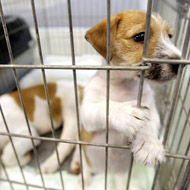European vets speak out against dog trade

The paper recommends a ‘harmonised approach’, taking into account the animal’s welfare, the health of the public, and the protection of the consumer.
'Profit should never take priority over animal health and welfare and should never harm the consumer.’
That is the conclusion of the European veterinary profession, speaking out against the problems surrounding the dog trade.
In a 14-page position paper, the Federation of Veterinarians of Europe (FVE), the Union of European Veterinary Practitioners (UEVP) and the Federation of European Companion Animal Veterinary Associations (FECAVA), call upon all those involved to work towards a future ‘in which dogs are traded in a respectful and responsible way.’
The paper recommends a ‘harmonised approach’, taking into account the animal’s welfare, the health of the public, and the protection of the consumer. Two ways this can be achieved, the vets identify, is through education and harmonised legislation.
‘[Education] is the cornerstone to ensuring that the public understands the responsibilities of dog ownership and are able to make informed decisions when purchasing a dog,’ the paper reads.
‘The veterinary profession involving all veterinarians should play an active role in the education of the public and in awareness campaigns working closely with NGOs and other stakeholders.’
The paper also states that close collaboration of the Member State Authorities would help to raise the standards of breeding, trading and keeping of dogs.
‘EU legislators should make it a priority to standardise the dog trade and protect animal welfare with a new EU animal welfare act as voted in Parliament in 2015,’ it adds
“It is essential to establish an equal level of compliance, which there is no fair and equal competition between Member States. However, trade should never take priority over animal health and welfare or public health and should never harm the consumer.’
To read the full report visit www.fve.org.



 The latest
The latest